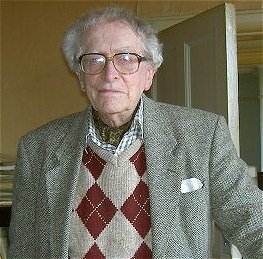ROY DOUGLAS
by John Walton

Roy Douglas was born in Royal Tunbridge
Wells, Kent on 12 December 1907. Roy
started to play the piano when he was
five, and at ten he was composing little
piano pieces. His mother squeezed a
shilling a week out of her meagre housekeeping
money to pay for lessons "so that
I could learn to play from the music",
but because of recurrent heart trouble
he had very little formal education
as a child, and he never had any lessons
in composition, orchestration or conducting.
From the age of eight,
when well enough, he "spent many
hours playing the piano, reading at
sight everything I could find from Beethoven
to ragtime". The family moved to
Folkestone, Kent in 1915, and in his
teens he played regularly in local concerts.
When he was 20 he joined the Folkestone
Municipal Orchestra as mustel organist,
deputy pianist, celesta player, extra
percussionist, librarian and assistant
programme-builder – all for £6 a week
for 14 performances and two rehearsals.
When Folkestone Council
cut orchestra salaries Roy resigned
and made a "decidedly risky"
move to the world of music in London,
where he lived in Highgate with his
parents and sister, Doris. But the move
paid off, for he was soon talent-spotted
by the London Symphony Orchestra and
from 1933 he was a full member, as pianist,
organist, celesta player, fourth percussionist
and librarian.
Among the distinguished
conductors under whom he played were
Bruno Walter, Hamilton Harty, Adrian
Boult, John Barbirolli, Henry Wood and
Malcolm Sargent. In addition, he played
many ballet seasons at the Alhambra,
Coliseum and Drury Lane theatres. He
recalls playing the piano part in Petrushka
eighty times, and "in the Prince
Igor dances I played triangle and
tambourine, both parts together, one
with each hand."
During the 1930s he
played the piano in many West End shows
including revivals of The Desert
Song and The Vagabond King as
well as performing light music in such
well-known restaurants as the Savoy
and Frascati’s, and in many popular
cinemas.
"Disgusted and
horrified by the many bad orchestrations
of Chopin’s music for the ballet Les
Sylphides," he writes, "I
eventually created my own orchestration
in 1936." For this work, he was
originally offered an outright fee of
£10. However, Roy’s version published
by Boosey and Hawkes, was quickly taken
up and continues to be used by ballet
companies all over the world. It has
also been recorded many times, so that
it still produces a useful income of
several thousand pounds a year.
As an orchestrator
Roy was indefatigable during and after
the Second World War and worked with
many composers including William Walton,
John Ireland, Alan Rawsthorne, Walter
Goehr, Arthur Benjamin and Anthony Collins.
He prepared a full orchestral arrangement
of Liszt’s Funerailles, and orchestrated
all Richard Addinsell’s music for eight
BBC programmes and 24 films, "including
the notorious Warsaw Concerto"
(Chappell & Co. Inc. New York: 1942).
He also arranged orchestral accompaniments
for such well-known singers as Peter
Dawson, Paul Robeson, Elisabeth Schumann
and Richard Tauber for HMV recordings.
"From 1944 until
the death of Ralph Vaughan Williams
in 1958," he writes, "I had
the unforgettable experience of being
his friend and musical assistant, helping
him to prepare works for performance
and publication, including his last
four symphonies and the opera Pilgrim’s
Progress. As Roy makes clear in
his book Working with Vaughan Williams
(British Library Publishing: 1988),
the composer’s manuscripts were very
difficult to read. A large part of his
job was to provide accurate and legible
copies, and to correct the numerous
mistakes in the original scores. He
also had to deal with the many changes
made in rehearsal, and to correct proofs.
Vaughan Williams described
this process as "washing the face"
of his music, while Roy saw himself
as a "musical midhusband"
to the composer’s new-born works. For
30 years, from 1942 to 1972, he performed
a similar service for William Walton,
whose scores were not quite so difficult
to read. But he, too, would frequently
change his mind, often at the very last
minute.
Over the years Roy
has composed many original works including
an oboe quartet (1932); two quartets
for flute, violin, viola and harp (1934/1938);
a trio for flute, violin and viola (1935);
Six Dance Caricatures for wind
quintet (1939), Two Scottish Tunes
for strings (1939); Elegy for
strings (1945); Cantilena for
strings (1957); Festivities and
A Nowell Sequence for strings
(1991). He has written music for 32
radio programmes, five feature and six
documentary films. "In my 70th
year I started writing music for brass
band, and when I was 73 I wrote my first
piece for military band commissioned
by the WRAC." Since then he has
mainly composed pieces for local players
and is an energetic President of Royal
Tunbridge Wells Choral Society
(www.rtwcs.org.uk).
In 1943 Roy was one
of the founder members of the Society
for the Promotion of New Music and an
early committee member of the Composers’
Guild of Great Britain, formed in 1944,
and was their Treasurer for five years.
In 1939 Roy moved back
to Royal Tunbridge Wells, and after
the Second World War he joined the local
Drama Club. "For 22 years, I found
acting an excellent way of forgetting
musical problems." He played many
roles, including Oberon, Shylock, Touchstone,
Ben Gunn and Dr Chasuble, and produced
three plays on the Pantiles (the colonnaded
walkway in Royal Tunbridge Wells). For
eight years he was Chairman of the Tunbridge
Wells Drama Club.
Motor-cycling was another
recreation which gave Roy great pleasure.
When he was 51 he bought a Triumph 200cc
Tiger Cub, which took
him all over England. This "lively
little bike" was replaced by a
Triumph 350cc on which he covered more
than 55,000 miles – until he was 80,
when his doctor put a stop to this "possibly
eccentric" activity. "But,"
Roy adds, "I still feel sadly deprived
of my beloved motor-bike."
John Walton ©
2005

